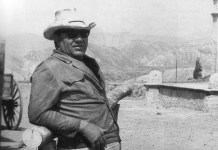Following on from his enormous success with The Act of Killing, Joshua Oppenheimer returns to the killing fields of Indonesia for The Look of Silence and in doing so has created a haunting and beautiful diptych.
This time Oppenheimer has taken a different approach to the troubled and bloody times, when over a million “communists” were slaughtered following a military coup in 1965. In his first film, there were reenactments of the violence, often with the perpetrators themselves playing different parts and often in full costume, alongside more surreal scenes (though I doubt there is anything more surreal than seeing a murderer cheerily reenact a massacre). The Look of Silence takes a more personal trajectory, following one man on a quest for truth. Born shortly after the atrocities in which his brother was brutally murdered, Adi Rukun is searching for someone prepared to take responsibility for their actions and to apologise for what they did, acting as what Oppenheimer calls a one-man truth and reconciliation committee.
Oppenheimer uses his subject’s profession as a door-to-door optician to good effect. We see these now old men having their eyes tested, with Adi asking “Is it clearer now?” These men are required to look into their past and to see what they did through different eyes. We also watch Adi watching videos of these murderers as they describe or recreate their actions. And as we watch, we are treated not only to the unflinching gaze of this incredibly heroic and dignified individual but also to moments of visual poetry: the pretty façade of a colourful house is juxtaposed with the interview taking place inside, as Adi confronts yet another murderer.
As Adi continues interviewing these men what they share is an initial boastful pride in what they did and how they did it, only to then fall back on similar excuses, seeming to share a total lack of remorse for their participation in this massacre. Two men state that they drank their victims’ blood “otherwise you’d just go crazy”, in no way considering that perhaps their drinking of human blood could be construed as insane.
This more intimate investigation into the murder of one man is more emotionally engaging than The Act of Killing. Meeting Adi’s elderly parents, we are pulled into his intimate family life and witness their equally intimate and raw pain at the memory of their brutally slaughtered Ramli. Oppenheimer does show a glimmer of hope when one assassin’s daughter discovers that her father drank human blood. She offers Adi the apology he is looking for and tells him that they are now family.
Having watched The Look of Silence we are left with another image of beans jumping with life inside them, for they house caterpillars waiting to emerge as butterflies. Hopefully, a more beautiful and just Indonesia will emerge when its people receive justice and reconciliation for those heinous acts so bravely reported by Joshua Oppenheimer.









